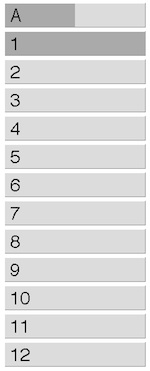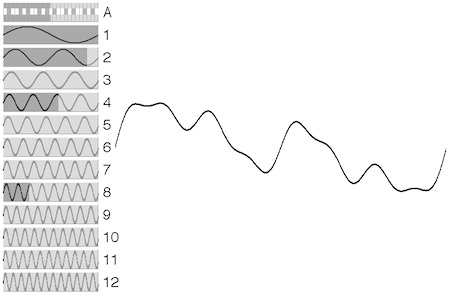A grand piano stood just as it should within the square
The young boy played aloud, there was a crowd assembled there
They smiled at the tune, for it was June. And by and by
A perfect summer day they whiled away. The Sun rose high
She smiled down with joy upon the boy. All days must end
And melt within your hand, but understand my friend
A grand piano stood just as it should within the square
So it shall ever be. For we, you see, were there.
Month: June 2011
Making waves
Harmonics
Musical notes generally consist of a mix of harmonic overtones. There’s the fundamental tone, which has some frequency of vibration, and then different amounts of overtones having twice that frequency, three times that frequency, and so on.
When I was a kid I always wanted some kind of gadget that would let me play around with the harmonics of notes, so I could hear what different mixes of harmonic overtones add to the sound of a musical note.
Now, through the magic of computers, I can make one of these for myself, and I thought it would be nice to share.
I’m sure I could find a tool somewhere on the web that does the same thing, but it was fun go all DIY and make one for myself. Click on the image below to jump to the Java applet:

Tissue
Connections between
Us, so strong, like cement, that
Can never dissolve
Until one day it
Rains, and then we may find it
All come apart like
Tissue
Pain perdu
“Pain perdu” — literally “lost bread”, the french term for what Americans call french toast. The idea of “lost bread” derives from the fact that bread in France is usually bought as a baguette, baked so as to be soft and delicious for just a single day. After that the bread starts to become hard and to lose its freshness. Bread that has been “lost” in this way is repurposed to make what we in the U.S. call french toast.
“Pain perdu” is indeed a fabulous term. When a french friend explained it to me, I told him it sounded like Marcel Proust’s famous memoir, except it would need to have a slightly different title: “À la recherche du pains perdu” — which might be a nostalgic multi-volume memoir about french toast.
When I said that, my friend laughed and told me that such a memoir would have to talk about Proust’s old girlfriend Madeleine (which makes sense if you’ve read Proust).
So I told him that in England the recipe might show up in a memoir by Lady MacBeth about her annoying little dog Spot (the one who is aways running underfoot, and never wants to go out when he’s supposed to). 😉
A dream couple
I was having the most wonderful conversation today with a man, a friend, who had asked me what I thought of his wife and him as a couple.
I told him I thought the two of them were perfect together because they complemented each other so well. Whereas he always seemed calm and centered, she was flighty and full of nervous energy. Somehow their two energies just fit together.
But it was more than that, I continued.
After knowing them both for a while, it had become clear to me that underneath his serene veneer, my friend was not at all as calm as he seemed. In fact, his air of quiet assurance was a way to deal with an inner feeling of alarm and nervous worry, whereas his wife was actually quite calm and centered underneath her appearance of nervous energy. And it was on this deeper level that their relationship truly worked well — still as a fitting together of complementary opposites, but not at all in the way one might at first think.
And then I woke up and realized that it had all been a dream — the man, the woman, my long answer to his question, our entire conversation.
Yet as I am thinking about it now, I suspect it wasn’t just a dream. I may simply have been reviewing, in my sleep, the hidden truth about every successful relationship: We are each our own opposite, and we fit best with someone who complements our own contradictory self.
French airport
Am writing this from the international Air France terminal at CDG airport in Paris. The flight has been delayed by two hours because of mechanical failure on the plane’s exhaust system, and they are getting us a nice new refurbished plane. I am not complaining mind you — I would much rather fly two hours later than try to set off across the atlantic on a jumbo jet with a busted tailpipe.
But it does provide occasion for a more in-depth exploration of this wonderful airport. Because yesterday was a holiday in France, everyone seems to have done their air travel in and out of Paris already, and the airport is refreshingly empty today.
An airport full of people can be a stressful experience, but an empty airport can be rather pleasant — especially here in Paris, where they have not caught the dread American disease that I fondly refer to as “let’s play loud non-stop music everywhere until people are ready to claw out their eyeballs in frustration”.
No, in France they are more civilized than that. And the espresso is better, IMHO. 🙂 If you need to be stuck in an airport for several hours, I highly recommend a french airport.
Pantheon
I love Manhattan, and I love Paris. Both are, of course, legendary in their magnetic power to inspire, to gather together great artists and thinkers. The two cities represent, each in its own way, a glittering vision of what a city can be.
Yet as a New Yorker walking around in Paris I am reminded of the immense differences. Manhattan is magnificent, but Paris is beautiful. Beautiful in a way that is hard to truly grasp unless you’ve been there. There is a gracefulness and elegance that pervades everything, from the architecture to the lifestyle to the conversational politesse.
Aesthetics matter to Parisiens in a profound and fundamental way that might not quite make sense to New Yorkers — and perhaps to Americans in general. And to be fair, Manhattan possesses compelling qualities that Paris does not. Our city has a drive, a sense of focus, a churning momentum and intensity of action, that one does not see in Paris.
It’s as though each city represents a different fundamental principle of human value, the way the gods of the ancient Greeks each represented a fundamental principle of human value.
Perhaps it makes sense to see great cities as a pantheon of gods, as constituting a kind of collective urban mythology. After all, why does anyone move to a place like Manhattan or Paris, if not to worship at its feet?
Ordering in french
This evening my friend in Paris said that I should make the reservation for our dinner at a nearby French restaurant, and she was quite insistent that I do this in french (because it would be good for me).
I called up the restaurant and made a reservation for 8pm (actually for “vingt heures”, which means 20 hours, if you do it in french, because they are on a 24 hour clock). I stumbled a bit here and there, but I thought I was doing pretty well, until the pleasant sounding guy on the other end switched into english.
Please understand that for an American, speaking to French people in french and having them reply in english is a total fail. They probably think they are being polite (or, that is, I hope they do), but to us it’s like being punched in the stomach, the cultural equivalent of “you clueless American, how could a boob like you ever think you could speak to us in our own language and not be found out?”
If you know what I mean.
But then my friend realized it would be better to change the reservation for 7:30pm, and she told me to call the restaurant back. This time, I was resolved to go for the win.
When that same man got on the line, I plunged forward, speaking in french with a firm resolve, and a renewed assurance borne from my fear of failure. I was commanding, yet I was polite. I gave a clear and unambiguous account of myself and of the situation. I was very french.
And I was rewarded. This time, the man never broke into english, but rather continued the entire conversation to its conclusion in french.
Success! My life was validated. My entire reason for existing on this planet suddenly held meaning, flavor, resonance. I realized that from this moment forth in my life, there would be nothing I could not do, nothing I could not accomplish with my vast, almost God-like powers.
For I had ordered a reservation dans la belle langue français†. And had been given a response — oh my foes and oh my friends — in french.
Yes! One for the win. 🙂
† It’s funnier if you read the comments
Procedural
As I’ve been building a library to create music procedurally, so that I can use the Kinect as a musical instrument, I find that my focus is shifting. I am becoming fascinated by the idea of building music entirely from the ground up, starting with the most “blank” canvas I can.
Just as I was drawn in past years to construct a complete computer graphic modeling, rendering and procedural animation package — starting with nothing but the ability to set the color at each pixel of an image — I find the equivalent question in music to be equally compelling.
As far as I can see, the “equivalent question in music” is to start with, say, a place to write something like 40000 samples every second (big enough to contain any audible waveform), and then write computer programs that specify the sound waves to into those samples, adding those waves together to make suitable harmonics that represent one musical instrument or another.
Then on top of that, build the attack and decay of individual notes, allow multiple channels for harmony, add pitch bend and vibrato, write procedures to lay one voice against another in syncopated rhythm, and gradually build toward creating entire musical compositions.
I know this sounds like a lot more work than just using an existing software package, but it’s also a lot more exciting. Kind of like building your own car from the ground up, and then seeing whether you can drive it across the country.
